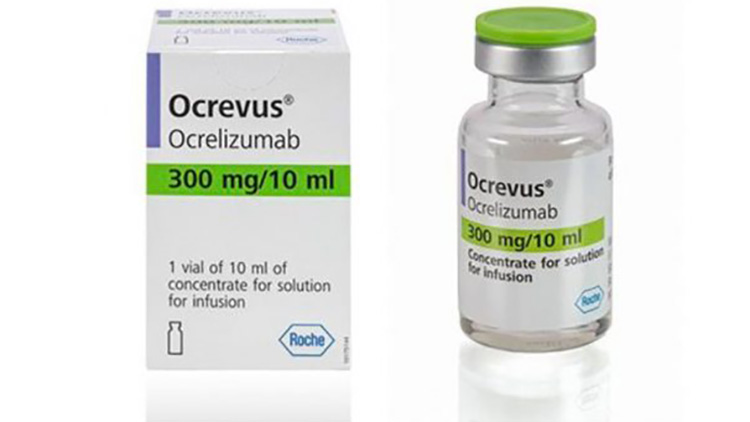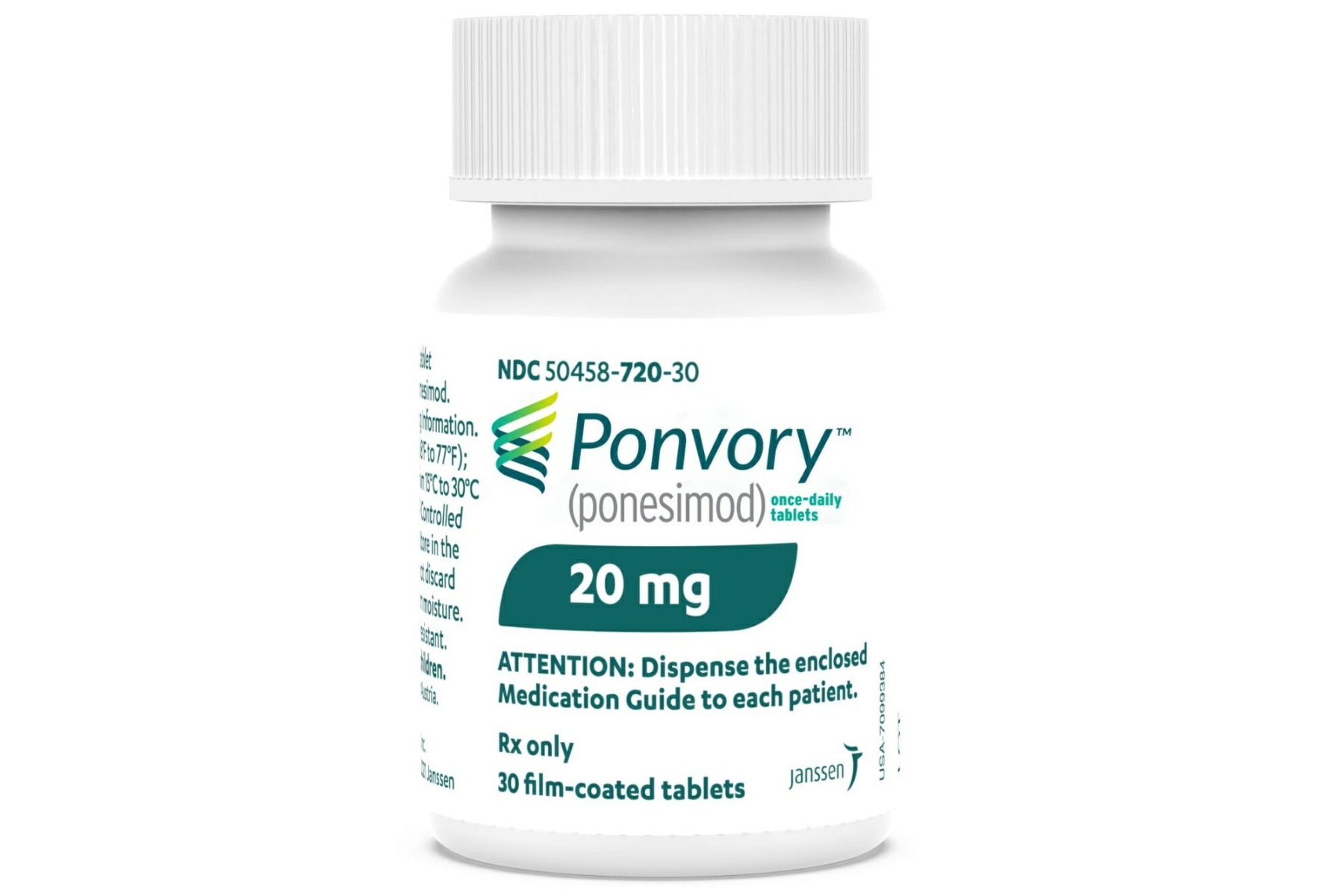Ocrevus (ocrelizumab) vs Ponvory (ponesimod)
Ocrevus (ocrelizumab) vs Ponvory (ponesimod)
Ocrevus (ocrelizumab) is a monoclonal antibody that targets CD20-positive B cells, thought to be a key player in the inflammatory and immune processes of multiple sclerosis (MS); it is administered via intravenous infusion every six months after the initial doses. Ponvory (ponesimod) is an oral selective sphingosine-1-phosphate receptor modulator that traps immune cells in lymph nodes, reducing their ability to contribute to nerve damage in MS; it is taken daily in pill form. When deciding between the two, patients should consider factors such as the method of administration, frequency of dosing, side effect profiles, and the specific type of MS being treated, as Ocrevus is approved for both relapsing-remitting and primary progressive forms, while Ponvory is approved for relapsing forms of MS, which include clinically isolated syndrome, relapsing-remitting disease, and active secondary progressive disease.
Difference between Ocrevus and Ponvory
| Metric | Ocrevus (ocrelizumab) | Ponvory (ponesimod) |
|---|---|---|
| Generic name | Ocrelizumab | Ponesimod |
| Indications | Primary Progressive Multiple Sclerosis (PPMS), Relapsing-Remitting Multiple Sclerosis (RRMS) | Relapsing forms of Multiple Sclerosis (MS), including Clinically Isolated Syndrome, Relapsing-Remitting Disease, and Active Secondary Progressive Disease |
| Mechanism of action | CD20-directed cytolytic antibody | S1P receptor modulator |
| Brand names | Ocrevus | Ponvory |
| Administrative route | Intravenous infusion | Oral |
| Side effects | Infusion reactions, infections, skin cancer, depression, pain in extremity | Upper respiratory infection, elevated liver enzymes, hypertension, respiratory tract infection, and bradycardia |
| Contraindications | Active Hepatitis B infection, history of life-threatening infusion reaction to Ocrevus | CYP2C9*3/*3 genotype, recent (within last 6 months) myocardial infarction (MI), unstable angina, stroke, transient ischemic attack (TIA), decompensated heart failure requiring hospitalization, or Class III/IV heart failure |
| Drug class | Monoclonal antibody | Sphingosine 1-phosphate receptor modulator |
| Manufacturer | Genentech (Roche) | Janssen Pharmaceuticals (Johnson & Johnson) |
Efficacy
Ocrevus (Ocrelizumab) Efficacy in Multiple Sclerosis
Ocrevus (ocrelizumab) is a monoclonal antibody designed to selectively target CD20-positive B cells, which are believed to play a key role in the pathogenesis of multiple sclerosis (MS). It is approved for the treatment of patients with relapsing forms of multiple sclerosis (RMS), which include clinically isolated syndrome, relapsing-remitting MS (RRMS), and active secondary progressive MS (SPMS), as well as primary progressive MS (PPMS). Clinical trials have demonstrated that Ocrevus significantly reduces the rate of relapses, slows the progression of disability, and decreases the number of new or enlarging brain MRI lesions in patients with RMS. In PPMS, Ocrevus is the first and only therapy approved to slow the progression of disability.
The efficacy of Ocrevus was evaluated in three major phase III clinical trials: the OPERA I and OPERA II studies for relapsing MS and the ORATORIO study for primary progressive MS. In the OPERA studies, Ocrevus demonstrated a significant reduction in annualized relapse rates compared to interferon beta-1a, a commonly used MS medication. The ORATORIO study showed a significant reduction in the progression of clinical disability sustained for at least 12 weeks compared to placebo. These results establish Ocrevus as an effective treatment option for both relapsing and primary progressive forms of MS.
Ponvory (Ponesimod) Efficacy in Multiple Sclerosis
Ponvory (ponesimod) is an oral selective sphingosine-1-phosphate receptor 1 (S1P1) modulator used for the treatment of adults with relapsing forms of multiple sclerosis, including clinically isolated syndrome, relapsing-remitting disease, and active secondary progressive disease. Ponesimod works by trapping certain white blood cells in lymph nodes, preventing them from reaching the central nervous system where they could potentially cause nerve damage. The efficacy of Ponvory in MS was primarily demonstrated in a phase III clinical trial known as the OPTIMUM study, which compared ponesimod to teriflunomide, another MS medication.
In the OPTIMUM study, Ponvory showed superiority to teriflunomide by significantly reducing the annualized relapse rate over a 108-week period. Additionally, Ponvory was more effective in reducing the number of new or enlarging MRI lesions and showed trends toward reducing the progression of disability. These results suggest that Ponvory is an effective oral treatment option for patients with relapsing forms of multiple sclerosis, with a favorable impact on relapse rates and MRI lesion activity.
Regulatory Agency Approvals
Ocrevus
-
European Medical Agency (EMA), European Union

-
Food and Drug Administration (FDA), USA

-
Health Canada

-
Therapeutic Goods Administration (TGA), Australia

-
Medsafe (NZ)

Ponvory
-
European Medical Agency (EMA), European Union

-
Food and Drug Administration (FDA), USA

Access Ocrevus or Ponvory today
If Ocrevus or Ponvory are not approved or available in your country (e.g. due to supply issues), you can access them via Everyone.org.
How it works

Make an enquiry
Choose the medicine you want to buy, answer a couple of questions, and upload your prescription to speed things up. We’ll get back to you within 24 hours.


Make an enquiry
Choose the medicine you want to buy, answer a couple of questions, and upload your prescription to speed things up. We’ll get back to you within 24 hours.


Breeze through the paperwork
We'll guide you through the required documents for importing unapproved medicine, ensuring you have all the necessary information.


Get a personalized quote
We’ll prepare a quote for you, including medicine costs and any shipping, administrative, or import fees that may apply.


Receive your medicine
Accept the quote and we’ll handle the rest - sourcing and safely delivering your medicine.

Some text on this page has been automatically generated. Speak to your physician before you start a new treatment or medication.
Let's talk
If you have any questions, call us or send us a message through WhatsApp or email:
Contact us




